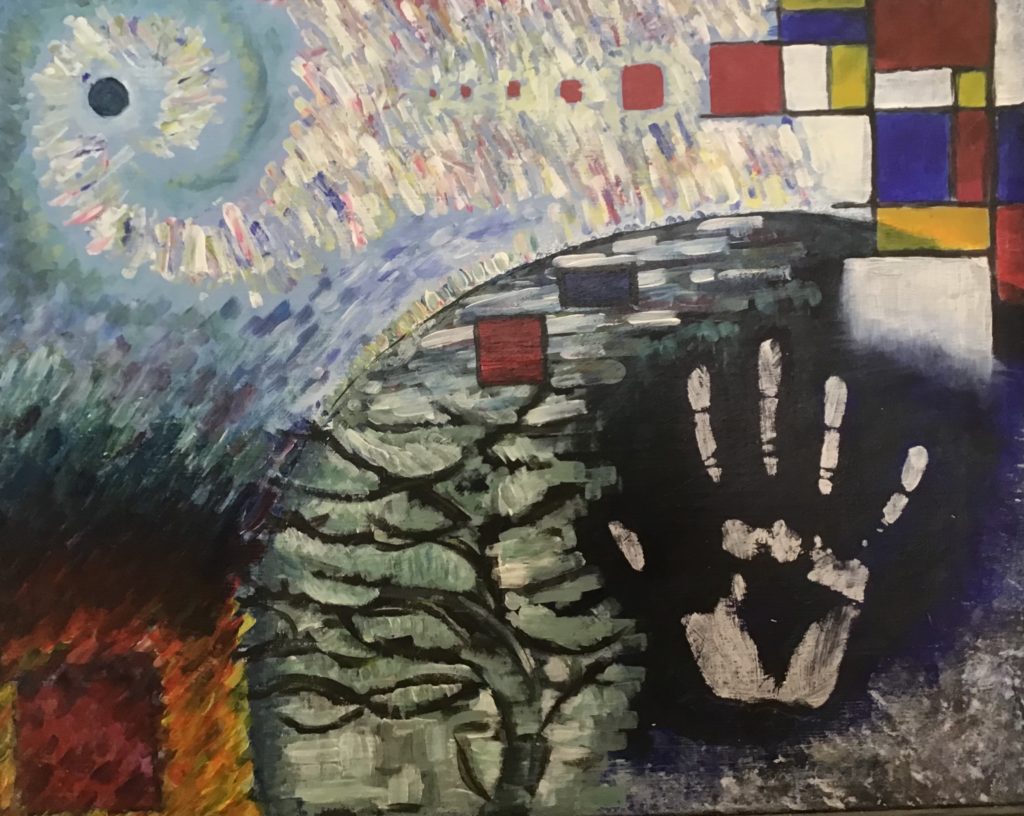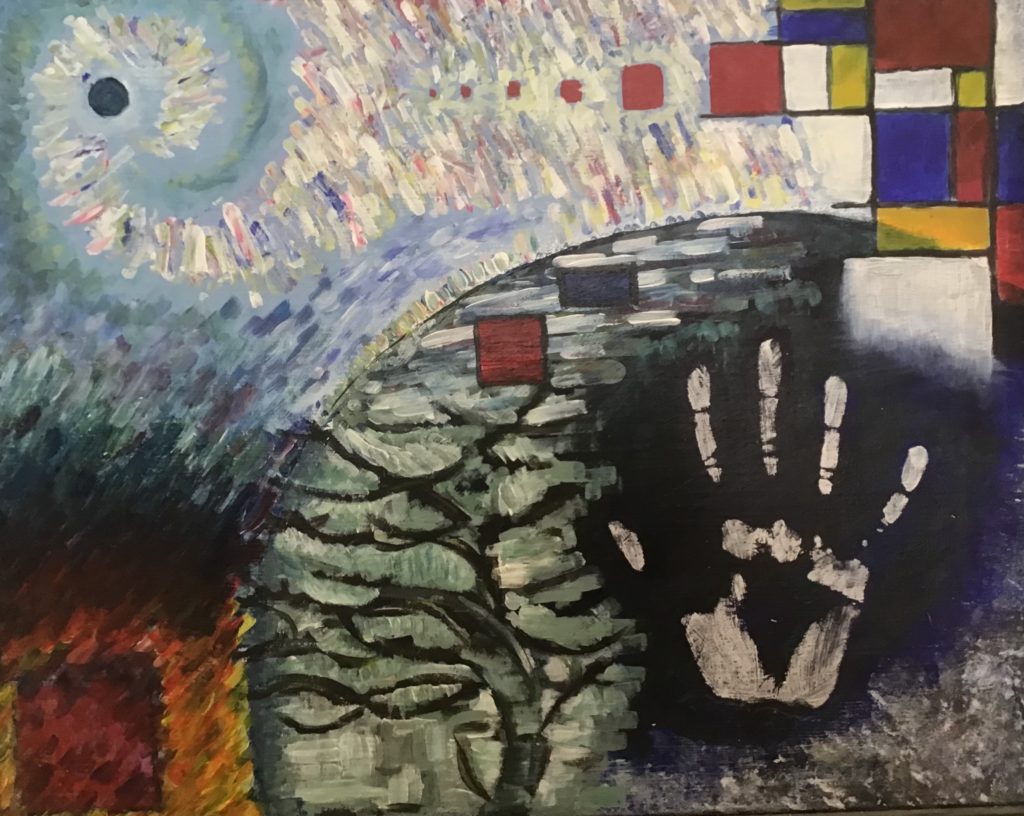I have been thinking a great deal in my life and work about how to be a part of the bridge between our current world systems and a sustainable, equitable future, one where human activity and enterprise doesn’t necessitate the destruction and disruption of our planet and its ecosystems. I believe that part of my role is to help transform stories.

Our dominant paradigm in the West, in broad strokes, (and I’m borrowing this fantastic phrasing from my even more fantastic coach, Kimberly Errigo) goes something like this:
“Everyone is competing to be the one who dies with the most toys.”
Even those in our culture who reject this paradigm may still define their actions and stances in reaction to this paradigm, the model we have of viewing life as individual organisms competing for survival in a context of scarcity. If we don’t aspire to be a bullish capitalist perishing proudly atop a pile of gold, then perhaps we swing to the other extreme and try to give away everything we have to others whom we view as needing our help (again, the assumption of scarcity, and that there’s not enough to go around).
If we look through the lens of stories, we begin to see the outlines of our primary cultural narratives underpinning our systems and institutions, incentive structures, and operating assumptions. Here in the Bay Area, I hear about tech workers micro-dosing in Silicon Valley to boost creativity and productivity; start-ups competing tooth and nail for VC funding; I get updates on the latest “life hacks” to help me solve a bunch of problems that I didn’t know I had so I can be more productive; there’s an app for everything under the sun; and everywhere I turn, I am urged to Buy! Buy! Buy! Upgrade! Hack this! Get ahead!
As a woman, a lot of what I am urged to buy comes down to fixing, adapting, changing, or improving my body or my physical functioning. I can buy products and services to slow down the aging process, to make me smarter, to make me energized or to chill me out; to make me prettier or thinner; to darken my skin, to lighten my skin; to boost my work effectiveness, to improve my posture, to whiten my teeth; to brighten my hair, to remove those dark circles under my eyes…
In sum, I am given countless ways to overcome my physical body’s needs, limitations, and ‘flaws’, and to reduce the inconveniences of living in a physical body. I am encouraged to think of my physical body as a means to an end, and also as fundamentally problematic and limiting: my body is framed as a vehicle I use to navigate life and to produce and succeed: it is framed as a means to pleasure, status, acceptance, and belonging, or a liability that threatens to prevent me from securing these things for myself.
The reason that I bring this up here is that I believe transforming our underlying paradigm and its associated narratives is a critical piece of addressing the ecological crisis. As long as I see ‘Nature’ as apart from myself, I do not have any pressing need to understand it, unless it relates to my immediate needs. In the West, I see our culture as viewing “Nature” as a sort of bank, a set of resources that we make withdrawals from to fuel our lives and meet our needs. We are interested in ecosystems and the natural world in so far as they impact what we have already decided to do in our lives, and we may even support reforestation initiatives or buy wild caught tuna because we recognize that stewarding and maintaining this resource bank makes good management sense. In this context, addressing the climate crisis is mostly about “fixing a problem” (and quickly, please) so that it doesn’t impact human life overmuch and I can go about business as usual but use corn-based plastic instead of conventional and probably recycle more and maybe drive a new model of cars (hopefully newer than my neighbor’s!)
What I propose is a radical reframing, and one that has the impact to change the way we relate first to ourselves, especially our bodies; and also the earth and its other inhabitants. So long as we see our bodies, the bodies of other living beings, and the planet itself as a means to an end (an end that is better and more praiseworthy than simply being in a body), we will continue operating in the way we always have.
Question: Do you have a pet at home, a dog or a cat or some other creature? If so, do you view your pet simply as a means to an end?
My guess is that you do not, and that you simply love their company. You like being with them. Non-human animals, generally speaking, are also profoundly present in their bodies, and they can be good teachers for us ‘top heavy’ human beings, who spend a lot of time in our heads regretting the past or worrying about the future.
Speaking for myself, my dog Ellie is the best, and she has been an amazing teacher for me. When I realized the discrepancy between how I was treating her and her physical needs and how I was relating to my own body and physical needs, I began to reflect more deeply on my priorities and my self-care goals. For example, I make sure that Ellie eats high quality food every day, I take her to the vet at the slightest sign of an ailment, and comfort her when she’s anxious.
In contrast, I began to catch myself practicing what I would call dutiful and results-based self care, where I would do the minimum I thought I could get away with in order to get onto the next thing. For example, I would grudgingly eat a full meal because I knew I was supposed to and it was ‘good for me’, but I wouldn’t take time to make food that I really enjoyed (it was taking time away from work!) or I would rush myself through the eating process to ‘get it out of the way’; I also noticed that I was irritated and impatient with myself for feeling tired or depleted or anxious, and I resisted making time and space to sit with myself and tune in to discover what my body was wanting and needing in that moment. I also noticed that I put off doctors appointments or ‘powered through’ a cold, because I didn’t want to deal with being sick.
And in turn, I have begun to investigate for myself the relationship between how I was relating to my body and how I was approaching my climate activism work. I believe that transforming our relationship with our own bodies is the first step in transforming the way we are meeting the ecological challenges of our times. We are being invited to let go of the story of human beings apart from nature, who hold dominion over nature and who now must (heroes that we are!) rescue the planet from ourselves; and instead to heal the divide we made between ourselves and our bodies (I for one blame Descartes!) and come home to ourselves.
Food for Thought:
- Do you have time in your schedule to just be? If not, take a moment to consider whether you might have beliefs about doing being better than being. (Spoiler alert: most of us do.)
- What’s one way (only pick one, my productivity-obsessed friends!!) you can be with your body in a slower, gentler and kinder way? Make time and space for that TODAY.

No responses yet